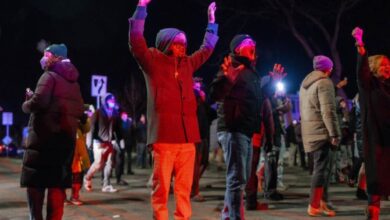El Salvador: Mega Prisons, a Real Solution Against Crime?
Regarding the opening of the new mega-prison in El Salvador, we review the reason for these centers and their actual impact on security.

Photo: presidencia.gob.sv
LatinAmerican Post | Luis Angel Hernández Liborio
Listen to this article
Leer en español: El Salvador: Las megacárceles ¿una verdadera solución contra la delincuencia?
Nayib Bukele, president of El Salvador, is known for his irreverence and controversial decisions. The young president has been characterized as controversial, an expert in using social networks and technology. Like any other millennial, the "modern" world is no stranger to him, taking risks like taking Bitcoin as legal tender or waging an ambitious war against gangs. In this last issue, he has given his most recent coup: constructing a mega-prison with which he seeks to stop the units. Is that the solution to organized crime?.
A Mega Jail, Bukele's Solution to Gangs
El Salvador is one of the Latin American countries with tremendous insecurity, a product of the control that gangs have and that is linked to other crimes such as kidnapping, human trafficking, and drug trafficking. The Salvadoran population and the country's economy are victims of the violence carried out by these criminal groups. In this context, Bukele launched a war against the gangs. If these groups are violent, the government is even more damaged. The Army and the police have shown their strength in the arrests of more than 60,000 people in less than two years. The problem is where to detain so many people?
The problem of prison overcrowding is a challenge shared by the region's countries, so confining them in the same prisons that are unsafe, overcrowded, and even controlled by gangs was more of a problem than a solution. So to deal a final blow to the power of these gangs, Bukele built a mega prison with a capacity of up to 40,000 people. Its first 2,000 "guests" have already arrived at the site located in Tecoluca, barely an hour from the country's capital. The harshness with which the government has faced crime has generated protests from organizations defending human rights, but Bukele continues while the numbers favor him.
The reduction in murders committed from 2019 to 2022 has been remarkable, going from more than 2,000 cases to barely hundreds, even with days in which murders are not officially reported. These results have raised the popularity of Bukele, who in his speech has taken advantage, despite the allegations of illegal detentions and human rights violations, as well as the complaint in the United States of having negotiated and agreed with the two main gangs of the country.
Mega Prisons in the World
Large prisons are characteristic of countries with serious security problems. The jail built by Bukele is by far the largest on the continent and in the world. It doubles the capacity of the Silivri prison in Turkey (22,000) and the jail in Los Angeles County, United States, and it also exceeds that of New Bilibid in the Philippines (28,500) by 10,000 spaces.
A prison of such dimensions represents numerous challenges for its administration, especially regarding security and control. Due to the size of the United States population, the Los Angeles County prison represents only a tiny percentage of the prison population. It is estimated at 1.6 million people, so its real impact differs from the new Salvadoran prison, where the prison population is 86,000, according to data from Human Rights Watch. Thus, a prison with a capacity of 40,000 people represents a radical change in the country's prison policy.
You can also read: Biodivercities: the Latino project that combines cement and nature
Turkey's Silivri prison is a different case, primarily intended to hold opponents of President Recep Tayyip Erdoğan's regime, including dozens of journalists. So it is not a prison designed to lower levels of insecurity but a place to keep unwanted people off the radar of the Turkish government. Even so, Turkey is one of the countries with a large prison population exceeding 300,000 inmates, mainly dissidents, migrants, terrorism suspects, and minorities. In the case of the Philippines, the New Bilibid prison is one of the most dangerous. In El Salvador, it is mainly intended for gang members and members of organized crime. Control over it is difficult to maintain. There are frequent murders among inmates. The Asian country ranks 11th among the countries with the largest prison population and one of the most overcrowded.
In Latin America, the countries with the largest prison populations are Brazil and Mexico, with 830,000 and 230,000 people, respectively. Overcrowding is notable in both countries; however, they continue to bet on the same model of "small" prisons distributed throughout the territory, divided by the type of crimes and dangerousness. Despite this, mega-prisons are outside their solutions or prison model, although the experiment by El Salvador could transform that vision in the future.
In the Mexican case, the problem is more profound. The judicial system must do more to retain the drug lords, who must be extradited to stand trial. So far, the Salvadoran model only works within the conditions in which the country finds itself, with a president who imposes his will and maintains a state of exception, which cannot be easily replicated in other countries in the same region. Whose tendency is to decentralize prison systems and not to create large prisons.




